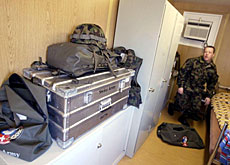New Swiss contingent deployed in Kosovo

The tenth contingent of Swiss peacekeepers began its tour of duty in Kosovo on Wednesday.
Swisscoy’s latest deployment has been overshadowed by the worst outbreak of violence in the province since 1999.
Although the situation has calmed down since the disturbances in March, the uncertain political future is continuing to affect living conditions in Kosovo, which remains under United Nations administration.
Peaceful cohabitation between the province’s Serbian and Albanian communities remains a pipedream. The Serb minority lives in enclaves, protected by international troops.
After the violence in March, the size of the Nato-led international force in Kosovo (KFOR) was increased.
Use of force
The United Nations authorised KFOR to use force wherever necessary to restore peace. For Swisscoy, too, security measures were beefed up.
The men and women of Swisscoy’s tenth contingent were completing their training in Switzerland when the violence erupted.
“Everyone realised suddenly that the relative calm of the past few years in Kosovo was an illusion and that below the surface tensions were seething,” said Adrian Baumgartner, spokesman for the Swiss Armed Forces International Command (Swissint).
“As a result of the violence, I think that respect for the mission has increased.”
Worst-case scenario
Baumgartner said training was geared for the worst-case scenario. “Recent events have shown that you can’t underestimate the situation.”
The important thing, he said, was to remain alert, scrupulously observe the safety measures and not be lulled into a false sense of security or lower one’s guard.
And even if the situation in Kosovo deteriorates, Swisscoy is in for the duration.
“Switzerland is part of an international effort and can’t just pull out,” said Baumgartner. “We’re all dependent on each other.”
Swiss soldiers have served in Kosovo since autumn 1999 but the first troops were unarmed.
However, voters agreed in June 2001 to allow Swiss soldiers to be armed for purely defensive purposes.
Swiss troops were traditionally not permitted to carry arms abroad because of the country’s strict policy of neutrality.
New threats
New challenges face the Swiss army today and Switzerland can no longer defend itself alone against terrorism or the spread of weapons of mass destruction.
Christophe Keckeis, head of the Swiss army, has repeatedly insisted that the Swiss military must engage more and more closely with the European Union and Nato.
Although not a member of Nato, Switzerland is likely to play a bigger part in future international peacekeeping efforts within the Partnership for Peace programme.
“Reducing this engagement would be extremely questionable,” said Andreas Wenger, head of the Centre for Security Studies at the Federal Institute of Technology in Zurich.
“For the Swiss Army, these missions are virtually the only opportunity to practise international cooperation.”
swissinfo, Rita Emch
Swisscoy has been taking part in peacekeeping duties in Kosovo since 1999.
Parliament agreed last year to extend its mandate until the end of 2005.
The three-year mission (2003-2005) will cost SFr78.9 million ($61.2 million).
The 200-strong Swiss contingent is composed of volunteers.
They will specialize in logistical, construction and medical duties.

In compliance with the JTI standards
More: SWI swissinfo.ch certified by the Journalism Trust Initiative










You can find an overview of ongoing debates with our journalists here . Please join us!
If you want to start a conversation about a topic raised in this article or want to report factual errors, email us at english@swissinfo.ch.